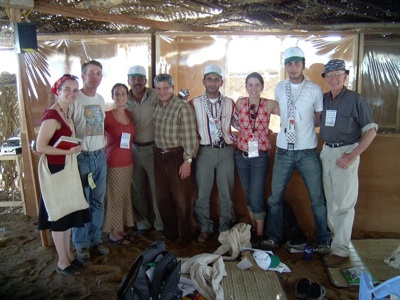Borders, Walls and Other Barriers: Farmers and Farmworkers from Palestine and North America Meet
I had the incredible opportunity to coordinate a meeting between the Union of Agricultural Workers Committees (UAWC) and the U.S. farmers and farm worker delegates to Nyeleni.
Present at the meeting were Omar Doanna, UAWC and Stop the Wall, Fuad Abu Sail, UAWC, Khalid Hedmi, UAWC, Zakaraya, a Palestinian farmer, Dena Hoff, NFFC, John Kinsman and John Peck, Family Farm Defenders, Carlos Marentes, Border Agricultural Workers.
The meeting was a rare chance for farmer-activists from very different places to share farming experiences, compare notes on movement-building strategy and show that human connection can conquer political divides.
As Khalid said, “We might have a far distance between Palestine and the U.S., but we can still work together.”

When it comes to food sovereignty in Palestine and for migrant and refugee communities, additional elements must be addressed that are not necessarily the same for settled fishers or farmers. These issues can largely be summarized as the impact of war, occupation and border restrictions on farmers’ and peoples’ rights to land and resources.
I learned about the everyday challenges to working with farmers who are struggling on occupied lands and resources. Simply working within Palestine, UAWC is challenged by not being able to meet face to face with staff members and farmers in different areas of the Occupied Palestinian Territories. Omar did not meet his colleagues in Gaza for 15 years. They could only communicate on the telephone.
Achieving food sovereignty under such oppressive conditions seems to be an impossible dream. But as John Peck said, “Your farmers have been able to survive, ours would be dead. We have so much to learn from you.”
Kahlid shared his experience. Key to their food sovereignty work is a seed project that develops improved, local variety seeds for basic foods and markets.
John Kinsman expressed concern about the ‘improved’ aspect of their seeds. He wondered if they were adopting Green Revolution-style approach to their seed development.
Khalid quickly explained that they are not—they do not use Genetically Modified Organisms or pesticides because they are detrimental to the environmental health of their water and families.
Their seeds, he explained, are ‘improved’ because they lost their original local seed banks through war. They had to revive their seeds and their knowledge about them.
Carlos, who is working to stop the wall along the Mexican and U.S. borders, talked with the Palestinians about how to strategize against the border wall.
Omar explained that the Stop the Wall campaign in Palestine uses two general approaches. On the national level, they work to strengthen people on the land. This means cultivating the land, planting olive trees—essentially claiming the land for Palestinian farmers. At the international level, they raise the case to the international community.
“We are sharing basically the same problem”, Omar said to Carlos. “It’s a problem for the world. It belongs to the international community—not just Mexico or Palestine.”
The meeting ended with suggestions for how U.S.and Palestinian farmers can work together in the future. Many good, imaginative ideas were put forward, including campaigning against the companies that are building the walls, fair trade through farmer-to-farmer markets, farmer exchanges, and sharing agricultural knowledge.
A day earlier Fuad told me, “It’s only through human connection like exchanges between U.S. farmers and our farmers that we can change perceptions about our struggle for land and our lives.”
I believe we did that today. Just one more gift from Nyeleni.
